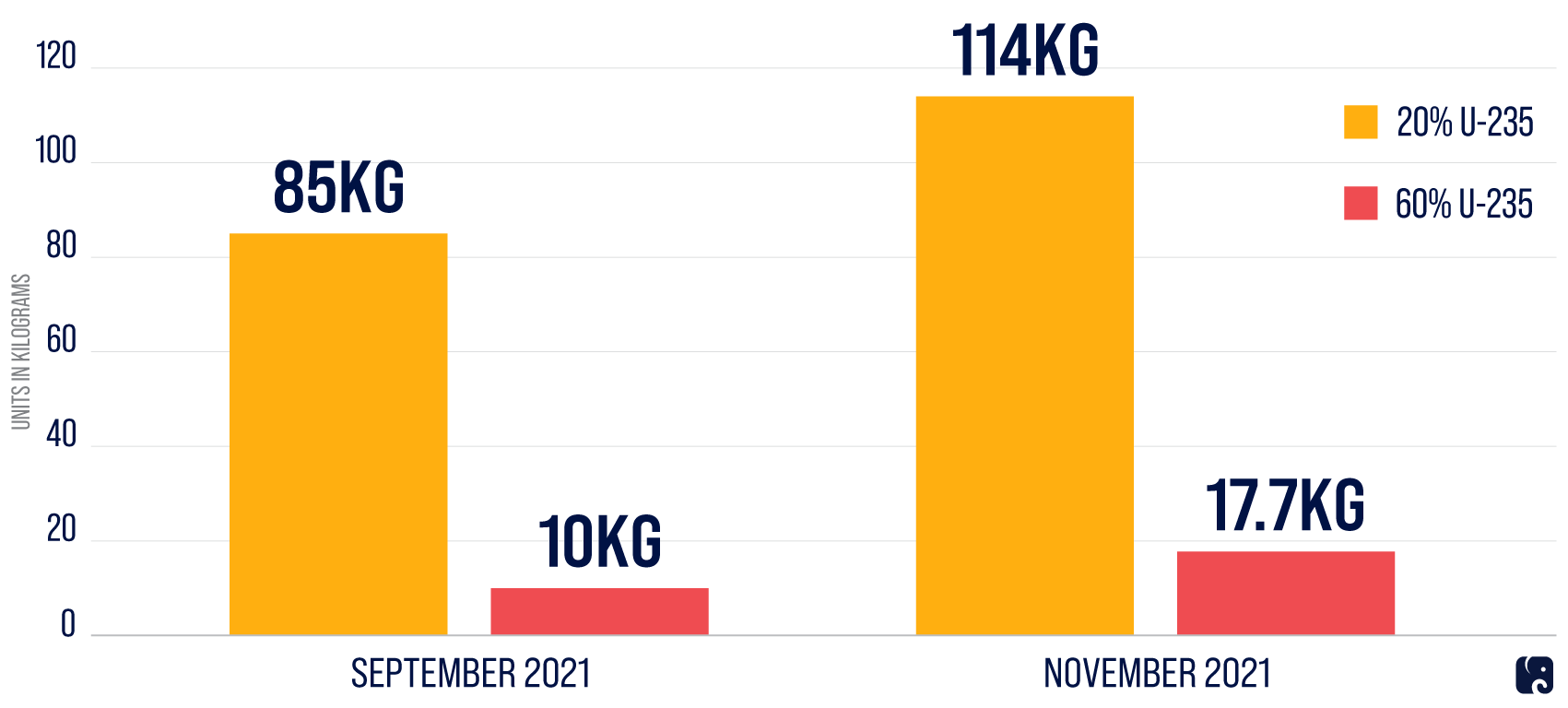Iran's March to the Bomb
KEY TAKEAWAYS
- Iran continues to march toward a nuclear weapon, enriching uranium and producing critical components.
- The Iranians continue to support and perpetrate acts of terrorism and other violence around the region.
- The Biden administration’s response is to fail to enforce U.S. sanctions and decline to provide our allies with critical support to protect them from Iranian aggression, while pursuing negotiations that degrade U.S. advantage and credibility.
Iran continues to march toward building a nuclear weapon while the Biden administration pursues a deal that will leave the rest of the world less safe. This strategy emboldens the Iranians not only to keep working on a bomb but also to destabilize the region by supporting terrorist groups and militias that target Americans and our allies.
Iran Increases Enriched Uranium Stocks
Looking to become a nuclear power
Experts believe Iran could produce enough weapons-grade uranium for a nuclear weapon in as little as three weeks, if they move to enrich their stockpile to that level. Weapons grade is considered to be uranium that has been enriched to 90% U-235 or higher. The potential breakout time is so short because of the substantial growth of Iran’s stockpile of uranium that has already been enriched to 20% and 60%, which is easier to enrich the rest of the way. The Iranians increased their supply of 60% enriched uranium dramatically last year, from 10 kilograms in September 2021 to 17.7 kg in November. Iran also added to its 20% enriched stock, which increased from 85 kg in September to 114 kg in November. Once enriched to 90%, the uranium would be ready to use in a weapon.
They also have installed close to 400 IR-6 centrifuges; 170 of them since September. The more advanced IR-6 centrifuges will allow the Iranians to enrich uranium more efficiently. In February 2021, Iran started producing uranium metal, a critical component in building a weapon. Under the guise of a space program, the Iranians continue to pursue advanced space payload delivery technology, which violates a U.N. resolution and is essential to developing an intercontinental ballistic missile.
Biden’s desperation for a deal
Iran’s Security Council had already rebuffed U.S. efforts to create a path back to the 2015 Iran nuclear deal in July. The country’s new hardline government, led by Ebrahim Raisi, is clearly not interested in re-entering the deal, only in getting sanctions relief for little in return. The head of Iran’s negotiating team is an outspoken critic of the 2015 deal. The Iranians are meeting the Biden administration’s overtures with unrealistic demands, such as guaranteed foreign investment from the U.S. and Europe, payment of billions of dollars, and relief from non-nuclear sanctions with no restrictions on Iran’s support for terrorists.
In the face of all this, the Biden administration has kept up its naïve pursuit of a nuclear deal; the U.S. is on the eighth round of indirect negotiations with Tehran. The administration sought allies’ views on an interim deal with Iran to create more space to negotiate. It is failing to meaningfully enforce existing U.S. sanctions, which decreases the pressure on the regime that could be used as leverage in negotiations. Iran increased its illegal oil exports to China last year, a clear violation of U.S. sanctions and another way of relieving the economic pressure sanctions had been creating. The administration claims it is going to aggressively tighten sanctions enforcement, but nothing more than warnings have materialized while the administration negotiates.
IRANIAN violence targets americans and partners
Iran continues to support terror and violence against Americans and our interests in the Middle East. Already this year, Iranian backed Houthi forces seized an Emirati cargo ship off the coast of Yemen. Iranian-backed groups launched several attacks involving explosive drones and rockets against Americans in Iraq and Syria.
In November, an Iranian-backed group attempted to assassinate the Iraqi prime minister. U.S. ally Bahrain arrested a group of suspected Iran-backed militants who were planning to launch an attack in the country. Militias supported by Iran launched attacks throughout the region, and Iran-backed Houthi rebels stormed the U.S. embassy compound in Yemen kidnapping Yemeni employees guarding the facility while the U.S. diplomatic mission in Yemen is suspended.
In December, the Saudis intercepted an Iranian backed Houthi ballistic missile over Riyadh. That attack was just one of several attacks with drones and missiles targeting oil fields and civilian areas. An attack in Saudi Arabia on December 24 killed at least two people.
Also on December 24, the Iranians fired 16 ballistic missiles in a military drill aimed at Israel saying, “We’ll cut off the Zionist regime’s hands if they make a mistake,” when describing the exercise. Israel has been pushing the Biden administration to provide weapons it can use to defend itself, but the president has refused.
Iran, and our allies and partners, are clearly getting the message that the U.S. is desperate for a deal and will not stand up to Iranian aggression. This can only further embolden Tehran’s march toward building a nuclear weapon.
Next Article Previous Article

